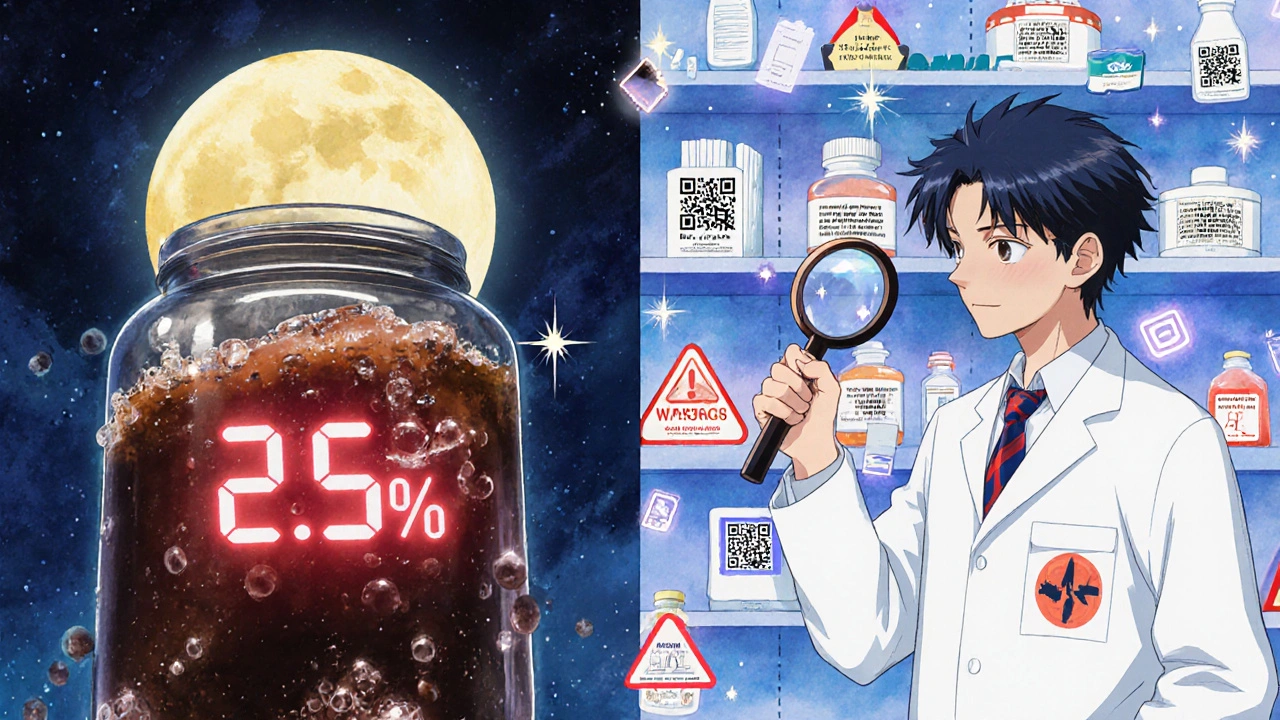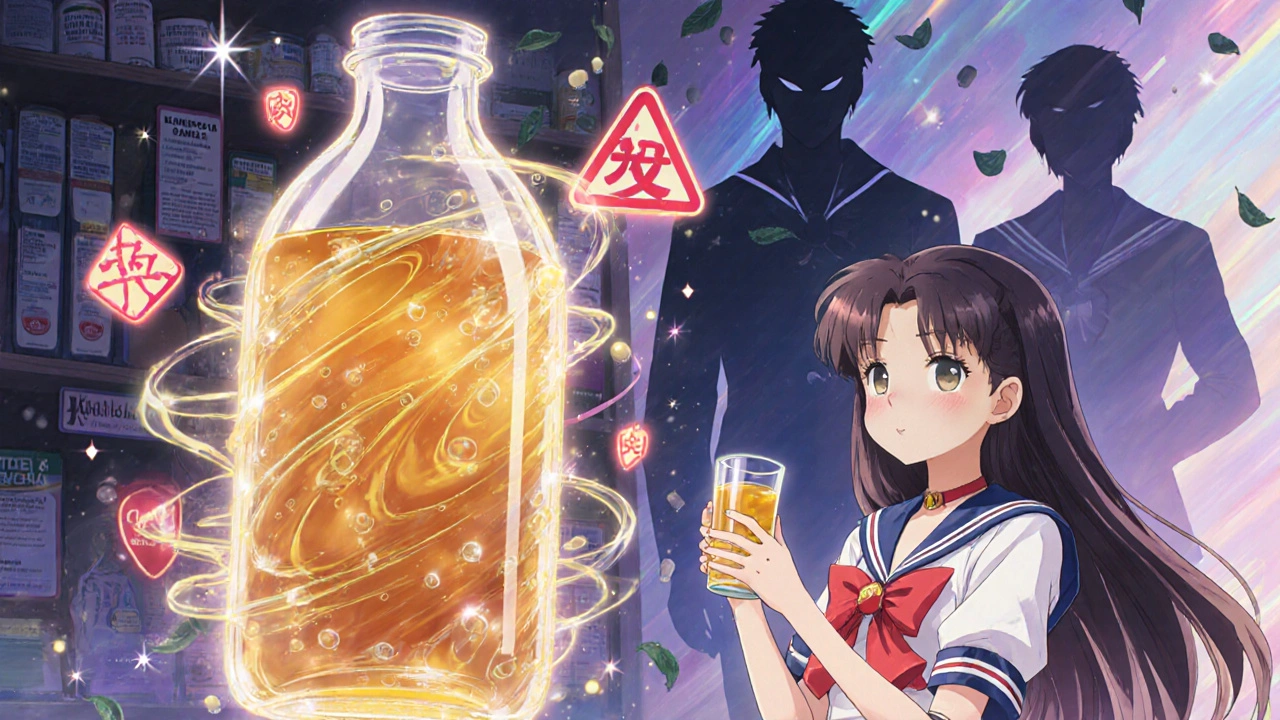Kombucha Medication Safety Checker
Your Medication
Results
Select your medication and kombucha type to see safety results
Many people drink kombucha for its probiotics, tangy taste, and supposed health perks. But if you're taking certain medications, that small bottle of fizzy tea could be more dangerous than you think. The problem isn't just the sugar or the caffeine-it's the alcohol. Even if you think kombucha is alcohol-free, it's not. And for people on medications that react badly to alcohol, even a tiny amount can cause serious side effects.
How Much Alcohol Is Really in Kombucha?
Kombucha is made by fermenting sweet tea with a culture of bacteria and yeast, called a SCOBY. During fermentation, the yeast eats sugar and produces alcohol and carbon dioxide as natural byproducts. That’s normal. But how much alcohol ends up in your drink? It depends on who made it.
Commercial brands in the U.S. are legally required to keep alcohol below 0.5% ABV (alcohol by volume). That’s the same limit as non-alcoholic beer. To stay under that, most big brands like GT’s or Health-Ade use pasteurization or filtration after fermentation. These steps stop the yeast from making more alcohol. But that doesn’t mean the alcohol is gone-it’s just locked in at a low level.
Homemade kombucha? That’s a different story. Without strict controls, alcohol levels can jump to 2.5% ABV-or even higher. A 2024 Harvard study found that 43% of homebrewed batches exceeded 0.5% ABV. Twelve percent reached levels close to light beer (3.2% ABV). That’s not a small amount if you’re on a medication that warns against alcohol.
Even “hard kombucha” sold in liquor stores-brands like Brew Dr. or Health-Ade’s higher-alcohol line-can hit 3% to 8% ABV. These are marketed as alcoholic beverages, but many people don’t realize they’re still kombucha.
Which Medications Are at Risk?
Alcohol doesn’t just make you feel woozy. It can interfere with how your body processes medications. Some drugs are especially sensitive to even trace amounts of alcohol. Here are the main ones:
- Antibiotics like metronidazole (Flagyl) and tinidazole: Mixing these with alcohol-even 0.5%-can cause severe nausea, vomiting, flushing, rapid heartbeat, and headaches. A 2023 case report in the Journal of Clinical Pharmacy and Therapeutics documented a patient who ended up in the ER after drinking homemade kombucha while on metronidazole.
- Antidepressants like sertraline (Zoloft) and fluoxetine (Prozac): Alcohol can make these less effective or worsen side effects like dizziness, drowsiness, and liver stress. Reddit users and pharmacists have reported multiple cases of increased anxiety and dizziness after kombucha consumption with SSRIs.
- Diabetes medications like metformin and chlorpropamide: Alcohol can lower blood sugar too much. One user on Diabetes Daily reported a 15-point drop in blood glucose after drinking kombucha with metformin, requiring an emergency room visit.
- Benzodiazepines like diazepam (Valium) and alprazolam (Xanax): Even small amounts of alcohol can amplify their sedative effects. Dr. Andrew Huberman from Stanford warns that kombucha’s alcohol can boost GABA receptor activity, making you feel more drowsy or impaired than expected.
- Nitrates for heart conditions: Alcohol can cause dangerous drops in blood pressure when combined with these drugs.
The American Pharmacists Association lists 17 major medication classes that can interact with alcohol-and kombucha counts as a hidden source. Many people don’t realize they’re drinking alcohol at all.
Why Commercial Kombucha Isn’t Always Safe
You might think buying from a store means you’re safe. But here’s the catch: labeling is inconsistent.
In 2023, only 63% of commercial kombucha products in the U.S. clearly stated “Contains Trace Alcohol” on the label, according to FDA compliance reports. Even if a bottle says “non-alcoholic,” that doesn’t mean it’s alcohol-free. The 0.5% limit is legal, not harmless.
And here’s another problem: batch variation. Even within the same brand, alcohol levels can shift slightly between batches. A 2023 ConsumerLab survey found that 18% of kombucha drinkers reported negative reactions with medications. Of those, 62% involved antidepressants and 29% involved antibiotics.
Some brands, like Health-Ade, now use blockchain traceability and QR codes to show exact alcohol content per batch. But most don’t. If you’re on a sensitive medication, you can’t assume safety just because it’s store-bought.

Homebrew Is Riskier Than You Think
If you make kombucha at home, you’re playing with variables you can’t fully control. Temperature, fermentation time, sugar amount, and even the type of tea all affect alcohol levels. A 2022 study of 200 homebrew batches showed 300% more variation in alcohol content than commercial products.
Most homebrewers don’t test their kombucha. Only 15% use any kind of alcohol meter, according to Kombucha Brewers International. The ones who do often use tools like the HM Digital HA-520 or Anton Paar’s Alcolyzer BEER. But those cost $50-$200. Most people just taste it and assume it’s fine.
That’s dangerous. A 2024 study from Harvard found that homebrewed kombucha was 3 times more likely than commercial to exceed 0.5% ABV. If you’re taking metronidazole or an SSRI, that’s not a gamble worth taking.
What Should You Do?
If you take any of the medications listed above, here’s what to do:
- Check your prescription label. Look for warnings about alcohol, grapefruit juice, or CNS depressants. If it says “avoid alcohol,” treat kombucha the same way.
- Ask your pharmacist. Most pharmacists don’t know kombucha contains alcohol. But if you ask specifically about “fermented teas,” they’ll check your meds against the latest interaction databases.
- Wait 48 hours. The Cleveland Clinic recommends avoiding kombucha for at least 48 hours before and after taking alcohol-sensitive drugs. That gives your body time to clear the medication.
- Test homebrew. If you brew your own, buy a simple alcoholmeter like the HM Digital HA-520. It costs less than $60 and gives readings accurate to ±0.1% ABV. It takes 3-5 batches to learn how to read it properly.
- Read labels. Look for “Contains Trace Alcohol” or “Alcohol by Volume: 0.5%” on the bottle. If it’s not there, assume it’s risky.
There’s no need to give up kombucha forever. But if you’re on medication, treat it like a glass of wine-not a health drink you can sip anytime.

The Bigger Picture
The kombucha market is booming-$3.2 billion in 2023, growing nearly 20% a year. But as more people drink it, more are getting sick from hidden alcohol interactions. In 2024, the FDA mandated that all commercial kombucha must now clearly label “Contains Trace Alcohol.” That’s a big step.
The National Institutes of Health launched a $2.3 million study in March 2024 to track these interactions. Early data is expected in mid-2025. Until then, assume kombucha has alcohol. Assume it can interfere with your meds. Assume you’re not alone if you’ve felt dizzy, nauseous, or shaky after drinking it.
Just because something is natural doesn’t mean it’s safe with your prescriptions. Fermentation isn’t magic. It’s chemistry. And chemistry doesn’t care if you think it’s healthy.
Can I drink kombucha if I’m on antibiotics?
If you’re taking metronidazole or tinidazole, no. Even 0.5% alcohol in kombucha can cause severe nausea, vomiting, and rapid heartbeat. Other antibiotics like linezolid also carry risks. Always check with your pharmacist before drinking kombucha while on antibiotics.
Is store-bought kombucha safer than homemade?
Store-bought kombucha is generally more consistent because brands are required to test for alcohol and keep it under 0.5% ABV. But not all brands label it clearly, and batch variation still happens. Homemade kombucha has far higher variability-up to 2.5% ABV or more-making it riskier for medication users.
Does kombucha show up on a breathalyzer?
It’s unlikely to trigger a positive result on a standard breathalyzer used by police, since 0.5% ABV is very low. But specialized alcohol sensors used in medical or workplace settings can detect trace amounts. If you’re subject to drug testing, it’s best to avoid kombucha altogether.
What are the signs of a kombucha-medication interaction?
Symptoms include sudden dizziness, nausea, vomiting, flushing, rapid heartbeat, confusion, or a sharp drop in blood sugar (if you’re diabetic). If you experience any of these after drinking kombucha while on medication, stop drinking it immediately and contact your doctor.
Are there alcohol-free alternatives to kombucha?
Yes. Look for fermented teas labeled “non-fermented” or “probiotic sparkling water” without live cultures. Brands like Kevita (some lines) and Health-Ade’s “Sparkling Probiotic” line (check labels) offer similar taste and probiotics without alcohol. Always verify the label says “0% alcohol” and “no fermentation.”
Final Thought
Kombucha isn’t the enemy. But if you’re on medication, it’s not harmless either. The alcohol isn’t a mistake-it’s a natural part of the process. And if your body is reacting to drugs that can’t handle even a little alcohol, then kombucha is a risk you don’t need to take. Talk to your pharmacist. Read the label. Test your brew. Your body will thank you.


rob lafata
November 20, 2025 AT 00:51Oh wow, so kombucha is basically a sneaky beer for hipsters who think they’re detoxing? I’ve seen people chugging this stuff like it’s holy water while on metronidazole. You’re not ‘healing,’ you’re just poisoning yourself slowly. If your meds say ‘no alcohol,’ then no fermented tea is exempt. Stop pretending natural = safe. It’s chemistry, not yoga.
Matthew McCraney
November 20, 2025 AT 16:40EVERYTHING IS A GOVERNMENT PLOT. The FDA only made them label it because Big Pharma paid them to scare people away from kombucha. I’ve been drinking homebrew for 7 years and my liver is stronger than ever. They’re hiding the truth - kombucha cures cancer, but they don’t want you to know. Also, my neighbor’s cat got sick after drinking it - coincidence? I think not. 🕵️♂️
serge jane
November 21, 2025 AT 20:32It’s fascinating how we’ve built this entire cultural narrative around fermentation as this mystical, ancient wisdom when in reality it’s just microbial metabolism. The yeast doesn’t care if you’re spiritual or sick - it just eats sugar and makes ethanol. The real issue isn’t kombucha, it’s our collective refusal to treat food and medicine as systems governed by physics and biochemistry. We want our tea to be magic and our pills to be safe, but biology doesn’t negotiate. You can’t have both.
Nick Naylor
November 22, 2025 AT 08:26Brianna Groleau
November 22, 2025 AT 15:08I just want to say - I’m so glad this article exists. I’ve been on Zoloft for years and I had no idea kombucha could make me feel like I was having a panic attack in slow motion. I used to drink it every morning like it was a spiritual ritual. Now I just sip sparkling water with lemon and feel so much calmer. It’s not about giving up joy - it’s about finding joy that doesn’t fight with your body. I’m not mad at kombucha, I’m just… wiser now.
Rusty Thomas
November 23, 2025 AT 09:44OMG I KNEW IT. I drank kombucha while on Xanax last month and I passed out on the couch for 3 hours. My roommate thought I was dead. I woke up with a headache and a 1000% guilt complex. Now I’m obsessed with this topic. I’ve started a TikTok series called ‘Kombucha or K.O.’ and it’s blowing up. Like, 20k followers in a week. People are sharing their ER stories. It’s wild. Also, I now only drink ‘sparkling probiotic water’ - totally alcohol-free, tastes like heaven. #KombuchaWakeUpCall
Sarah Swiatek
November 23, 2025 AT 21:30Let’s be real - if you’re on antibiotics and you’re still drinking kombucha because ‘it’s just 0.5%’, you’re not being brave, you’re being dumb. I’m a pharmacist and I’ve seen patients come in with alcohol-induced disulfiram reactions after drinking ‘health drinks’. The worst part? They’re always shocked. ‘But it’s organic!’ No, sweetheart, organic doesn’t mean non-reactive. It means the yeast didn’t use synthetic sugar. The alcohol? Still there. Still dangerous. Still your fault for not asking.
Dave Wooldridge
November 25, 2025 AT 10:33THEY’RE HIDING THE TRUTH. The real reason they don’t want you to know kombucha has alcohol is because they’re trying to keep you dependent on Big Pharma. Imagine if people stopped taking antidepressants and just drank kombucha instead? The stock prices would CRASH. That’s why they’re pushing this ‘trace alcohol’ nonsense. It’s a distraction. I’ve seen the documents. The WHO knew this in 2018. They’re covering it up.
Rebecca Cosenza
November 27, 2025 AT 00:32Just don’t drink it if you’re on meds. Simple. 😌
swatantra kumar
November 28, 2025 AT 14:41Bro I’m from India and we’ve been fermenting drinks for centuries - think kanji, toddy, even homemade lemonade with yeast. No one ever got sick. Maybe your meds are the problem, not the kombucha? Also, why are you so scared of natural things? I drink 3% ABV kombucha with my metformin and my sugar levels are better than ever. Maybe you need to fix your body, not ban the tea. 🙏
Cinkoon Marketing
November 28, 2025 AT 21:26Actually, I think this article is a bit alarmist. I mean, kombucha has been around forever - it’s not like it’s a new chemical compound. If you’re sensitive to alcohol, sure, avoid it. But blaming kombucha for your medication issues? That’s like blaming oranges for your statin side effects. Also, I run a wellness brand - we sell kombucha. Just saying. 🤷♀️
robert cardy solano
November 29, 2025 AT 18:59My grandma made kombucha in a crock in her basement for 40 years. Never had a problem. I drink it now with my blood pressure meds. No issues. Maybe it’s not the kombucha - maybe it’s the overmedicated, over-analyzed culture we live in. Chill out. Drink your tea. Life’s too short to be paranoid about 0.5%.
Pawan Jamwal
December 1, 2025 AT 04:07USA always overreacts. In India, we drink toddy with antibiotics and no one dies. Kombucha is just tea with bubbles. If your body can’t handle 0.5% alcohol, maybe you’re the problem, not the drink. Also, why are you scared of fermentation? It’s the oldest form of food preservation. You think penicillin was made in a lab? Nah. Moldy bread. Nature knows best. 🇮🇳💪